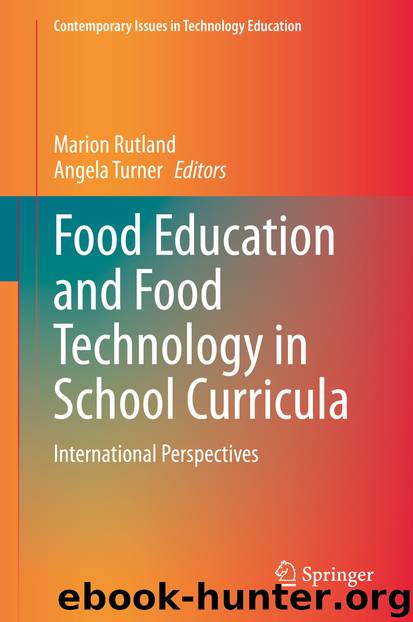Food Education and Food Technology in School Curricula by Unknown

Author:Unknown
Language: eng
Format: epub
ISBN: 9783030393397
Publisher: Springer International Publishing
Promoting Professional Identity Transition
In the study The Changing Professional Identity of Food Technology Teachers (Trevallion, 2017), the participants enrolled in a TE Foundation course embedded within a Bachelor of Education—TE programme. This programme is only available to students with: a technology-related industry background, a minimum of 6 years’ work experience, demonstrated success in ongoing learning and a range of personal attributes. Students enter the teaching programme on a competitive basis through an analysis of an evidence-based entry folio prepared by the applicant.
This research, based on the ontology of experience (Clandinin, 2007) used reflective narratives to capture the pre-service TE students’ life stories. It is these stories that have provided insight into the pre-service TE students’ professional identity. Identity is not viewed as static or fixed; instead, identity is framed using language formation where changes in professional identity are described by a socialising process that shapes identity (Woolfolk, 2007; Zare-ee & Ghasedi, 2014). This identity formation involves both identification and negotiability (Maynard, 2011). Identity is shaped by a lifetime of activity and interactions including past and present personal and professional life experiences (Day, Kington, Stobart, & Sammons, 2006; Furlong, 2013), prior university courses (Smith, 2007) and school and community-based encounters and collaborations (Rodríguez-Sabiote & Gallego-Arrufa, 2015; Woo, 2015).
Lev Vygotsky, in 1978, coined the term ‘social constructivism’, arguing that cognitive functions originate in, and are products of, social interactions. Learning is not just the assimilation of new knowledge; it is the process used to integrate learning into a knowledge community (Creswell, 2009; Lincoln & Guba, 2000). A key assumption in the constructivist classroom is that what the student currently believes, whether correct or incorrect, is important. In this study, all TE student beliefs and understandings were valued and built upon allowing open discussion of all perspectives. The researcher assumed that despite the pre-service TE students having the same learning experience, each TE student will base their learning on the understanding and meaning personal to them. Constructing meaning is an active and continuous process, and as a result the TE students understanding changed as they progressed through the coursework, completed activities and gained experiences that challenged and expanded their thinking.
Learning, involved some conceptual changes, for example in this case the student’s conceptual understandings about TE moves from a traditional, hands-on, approach to TE that focusses on problem solving. In order to do this, it is necessary to acknowledge that when a student constructs a new meaning, they may not believe it but may give it provisional acceptance or even rejection. As constructing meaning is continuous, understandings evolve over time as the students undertake the responsibility to learn more about imposed concepts.
The pre-service TE students’ transitioning of professional identity evolves through social constructivism, such as, social group membership (Hooley, 2007). Here the pre-service TE students share a common goal of becoming a TE teacher and share characteristics such as dignity, pride, respect, shared values and beliefs. As they work together to achieve their goal, their professional identity will be impacted upon through social constructivism.
Download
This site does not store any files on its server. We only index and link to content provided by other sites. Please contact the content providers to delete copyright contents if any and email us, we'll remove relevant links or contents immediately.
The Art of Coaching Workbook by Elena Aguilar(51198)
Trainspotting by Irvine Welsh(21663)
Twilight of the Idols With the Antichrist and Ecce Homo by Friedrich Nietzsche(18632)
Fangirl by Rainbow Rowell(9249)
Periodization Training for Sports by Tudor Bompa(8271)
Change Your Questions, Change Your Life by Marilee Adams(7780)
This Is How You Lose Her by Junot Diaz(6885)
Asking the Right Questions: A Guide to Critical Thinking by M. Neil Browne & Stuart M. Keeley(5775)
Grit by Angela Duckworth(5614)
Red Sparrow by Jason Matthews(5471)
Paper Towns by Green John(5188)
Room 212 by Kate Stewart(5119)
Ken Follett - World without end by Ken Follett(4731)
Housekeeping by Marilynne Robinson(4446)
The Sports Rules Book by Human Kinetics(4385)
Papillon (English) by Henri Charrière(4274)
Double Down (Diary of a Wimpy Kid Book 11) by Jeff Kinney(4268)
The Motorcycle Diaries by Ernesto Che Guevara(4098)
Exercise Technique Manual for Resistance Training by National Strength & Conditioning Association(4071)
